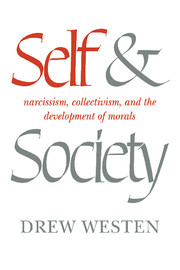Book contents
- Frontmatter
- Contents
- Preface
- Part I A theory of personality
- Part II A theory of culture
- Part III Personality and culture: a synthesis
- 8 Culture and personality: dying species or vigorous hybrid?
- 9 Psychic and sociocultural structure and dynamics
- 10 Personality and communitarian collectivism
- 11 The psychodynamics of modernization
- 12 Personality and sociocultural change
- 13 Breakdown and recovery: paradigmatic processes in personal identity and cultural integration
- 14 Personality and individuation
- References
- Index
9 - Psychic and sociocultural structure and dynamics
Published online by Cambridge University Press: 11 November 2009
- Frontmatter
- Contents
- Preface
- Part I A theory of personality
- Part II A theory of culture
- Part III Personality and culture: a synthesis
- 8 Culture and personality: dying species or vigorous hybrid?
- 9 Psychic and sociocultural structure and dynamics
- 10 Personality and communitarian collectivism
- 11 The psychodynamics of modernization
- 12 Personality and sociocultural change
- 13 Breakdown and recovery: paradigmatic processes in personal identity and cultural integration
- 14 Personality and individuation
- References
- Index
Summary
Personality develops in the context of culture, just as culture only exists through the thoughts, feelings, and behaviors of concrete people. One would thus expect that the dynamics of individual mental life and action dovetail with the dynamics of cultural life and action. The motives of individual actors press for solutions within the socio cultural context, and the dynamics of culture reciprocally condition both cognitive evaluative mismatches and methods for their resolution. The present chapter will examine the relationship between the structure and dynamics of personality and of culture. It will first discuss the relation between psychological motives and cultural processes. It will focus in particular on the way culture helps fulfill psychological motives through the patterning of individual and collective responses. Secondly, it will try to show how a single model can account for both stasis and change and will explore evolutionary processes in culture and personality.
Psychological Motives and Cultural Processes
Chapter 2 argued that motivation at the psychological level can be understood in terms of cognitive-affective schemas, and that people form affect laden set-goals of desired states. A mismatch between the goal or ideal and cognized reality produces an aversive feeling that motivates action. Much of this process can occur without actual affective mediation through cognitive anticipation of affective consequences of actions or through cognitive processes serving a feedback function, as when a person recognizes and corrects minor divergences from a plan, script, or goal.
At the societal level, Chapter 6 proposed that collectivities form setgoals as well, and that divergences from these set-goals similarly evoke control mechanisms to eliminate the mismatch.
- Type
- Chapter
- Information
- Self and SocietyNarcissism, Collectivism, and the Development of Morals, pp. 299 - 309Publisher: Cambridge University PressPrint publication year: 1985



